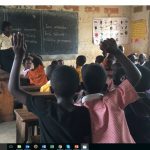Under the five-year USAID/Uganda Literacy Achievement and Retention Activity – Performance and Impact Evaluation (LARA P&IE), Panagora Group developed a comprehensive Child Protection Policy and Protocol that effectively addresses ethics and safety for children and adolescents when collecting information from them on psychological, physical, and sexual violence. USAID has declared this Child Protection Policy and Protocol a “gold standard” and is adapting it for use across Africa.
Gender-based violence (GBV) causes long-lasting trauma and negatively affects women and girls disproportionately. Those living in economically depressed and crisis-affected areas are particularly at risk. School-related gender-based violence (SRGBV) impacts 246 million children every year around the world. Girls are most at risk, and the result is low school attendance levels, academic under-performance, higher dropout rates, physical injuries, sexually transmitted infections, HIV and AIDs, and early pregnancy – exacerbating the cycle of poverty
 In Uganda, the problem is severe. According to UNESCO, in 2015 in Uganda, “78% of primary and 82% of secondary school students reported having experienced sexual abuse at school,” with “67% perpetrated by male teachers.” LARA works to improve early grade reading and retention, and reduce SRGBV in schools. As subcontractor on LARA P&IE to NORC of the University of Chicago, Panagora helps measure performance of LARA and is responsible for SRGBV technical expertise, including SRGBV data collection.
In Uganda, the problem is severe. According to UNESCO, in 2015 in Uganda, “78% of primary and 82% of secondary school students reported having experienced sexual abuse at school,” with “67% perpetrated by male teachers.” LARA works to improve early grade reading and retention, and reduce SRGBV in schools. As subcontractor on LARA P&IE to NORC of the University of Chicago, Panagora helps measure performance of LARA and is responsible for SRGBV technical expertise, including SRGBV data collection.
When collecting data on violence with children and adolescents, their privacy and protection must be preserved by using a child- and survivor-centered approach. To mitigate their potential risk of revictimization, stigmatization, or incrimination, we developed this child- and survivor-centered, trauma-informed Child Protection Policy and Protocol. It aligns with global standards of child protection, ethics, safety in researching violence against children, and conforms to Uganda’s socioeconomic and legal context.
The Protocol provides an accountable process for protecting child participation in research on SRGBV and equips interviewers, study counselors and data collection team supervisors with best communications practices. As well as with child violence survivors, strategies for upholding respondent confidentiality, how to help calm the “fight, flight or freeze” response in a child respondent who may become emotionally triggered, and how to conduct a rapid health and safety assessment to inform onward referral processes.
It is not easy, particularly in a low-income country context where child protection mechanism and support services require much greater resource investment and strengthening. To meet these challenges, Panagora’s SRGBV evaluation expert worked with a Ugandan education and child protection specialist who provided baseline and midline training specially designed for enumerators, moderators, and study counselors to help ensure the faithful implementation of the Protocol. After the recent midline training, one study counselor said, “I have been transformed … to an advocate of ending SRGBV in our schools… I have developed self-awareness about child abuse and I can now easily identify both overt and covert forms of violence against children.”
In addition to the Protocol, Panagora has also designed an SRGBV subject matter database that houses over 200 sources concerning SRGBV program interventions, studies, indicators, methods, tools, and protocols. The database serves as a knowledge center for relevant SRGBV program interventions that seek to effectively protect and empower child survivors.
Though the Protocol was designed with Uganda’s child protection laws and systems in mind to support data collection efforts of the P&IE team, it is highly adaptable and comprehensive, and aligns with global standards of child protection, ethics, safety, and best practices. It represents an invaluable resource to governments working to meet their sustainable development goals (SDGs), especially related to education and gender equality. Recognizing its value, USAID has adopted the Protocol as a “gold standard.”
About Panagora Group
As a woman-owned small business, Panagora offers the best of all worlds—the efficacy, discipline and results orientation of the private sector, and proven ability to manage complex and fast-moving programs, with the special enthusiasm, agility, and creativity of a small business. True to our name, Panagora is an “inclusive space where ideas bubble and the best thrive and spread.”
Learn more about Panagora Group at https://panagoragroup.net/







